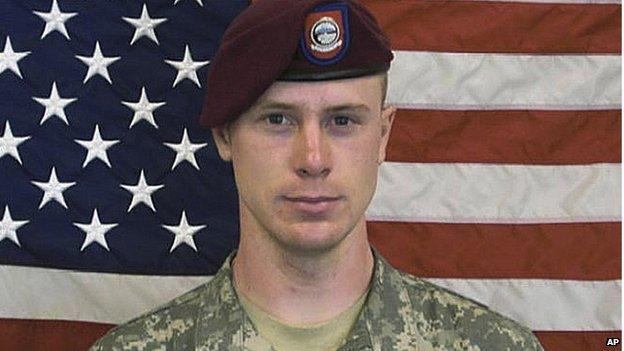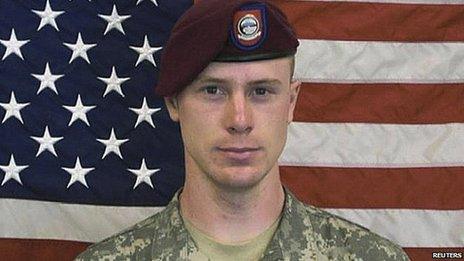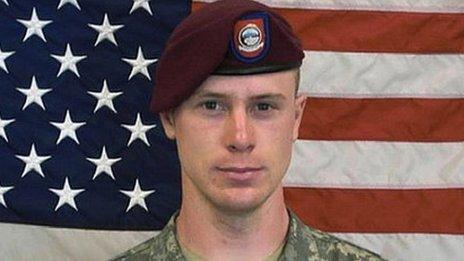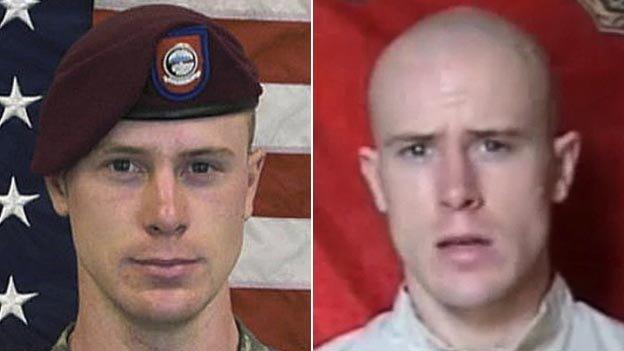Soldiers conflicted on Bowe Bergdahl prisoner exchange
- Published
- comments

Some US soldiers are angered by casualties incurred during the search for Bowe Birgdahl
On Saturday President Barack Obama announced the US had reached a deal with Taliban forces to exchange captured soldier Sgt Bowe Bergdahl for five Taliban officials being held in the Guantanamo Bay detention facility.
The prisoner exchange was condemned by some Republican politicians as setting a bad precedent for "negotiating with terrorists". Others were angered, external that members of Congress were not given 30 days' notice of a Guantanamo detainee transfer, as set out by US law.
Defenders of the deal noted, external that prisoner exchanges with unsavoury elements are a common part of war, particularly as a conflict is drawing to a close.
The news has also sparked a debate within the military community, as some veterans of the Afghanistan war have come forward to wonder whether efforts to rescue Mr Bergdahl were worthwhile.
There are questions regarding exactly how Sgt Bergdahl was captured by Taliban forces in 2009, with some reports indicating that he left his post without authorisation.
In the Daily Beast, soldier-turned-journalist Nathan Bradley Bethea details his experience, external as part of the extensive search-and-rescue effort the US military conducted after Sgt Bergdahl's disappearance - and its cost. (Bethea spoke with BBC Radio 5 about his article.)
"Bergdahl was a deserter," he writes, "and soldiers from his own unit died trying to track him down."
He says that the US conducted daily search missions for Sgt Berdgahl "across the entire Afghanistan theatre of operations":
It was hard, dirty and dangerous work. The searches enraged the local civilian population and derailed the counterinsurgency operations taking place at the time. At every juncture I remember the soldiers involved asking why we were burning so much gasoline trying to find a guy who had abandoned his unit in the first place. The war was already absurd and quixotic, but the hunt for Bergdahl was even more infuriating because it was all the result of some kid doing something unnecessary by his own volition.
He goes on to name US soldiers who died during these operations, as well as those who were killed elsewhere because, in the opinion of a fellow soldier, intelligence resources their units could normally rely on were being redeployed to assist in the search.
"For the veterans of the units that lost these men, Bergdahl's capture and the subsequent hunt for him will forever tie to their memories, and to a time in their lives that will define them as people," he writes. "He has finally returned. Those men will never have the opportunity."
Other news outlets have quoted US soldiers who echo Bethea's concerns.
Former Pte Jose Baggett told CNN, external that Bergdahl abandoned his guard post.
"Nobody knows if he defected or he's a traitor or he was kidnapped," he said. "What I do know is he was there to protect us and instead he decided to defer from America and go and do his own thing."
"I had a responsibility while I was there to the guys I was with, and that's why this hits the hardest," Javier Ortiz, a former combat medic who served in Iraq, told, external the Washington Post. "Regardless of what you learned while being there, we still have a responsibility to the men to our left and right. It's terrible, what he did."
Other soldiers emphasised that the US pledge to rescue captured troops, no matter the cost, is a comfort to those in combat.
"As an active participant in door-to-door, close-quarters combat in Iraq, one of the things that brought me hope was the fact that I was valued enough by my country that I knew my nation would do everything within its power to bring me home if I was ever captured," former Army medic and Iraq War veteran Brock McNabb told, external Time magazine. "Each soldier in the US is a valued treasure, and we knew that if we were ever captured, our guys wouldn't stop looking."
In the end, Bethea writes, he has forgiven Bergdahl because "it was the only way to move on".
"I wouldn't wish his fate on anyone," he says. "I hope that, in time, my comrades can make peace with him, too. That peace will look different for every person. We may have all come home, but learning to leave the war behind is not a quick or easy thing."
- Published3 June 2014

- Published2 June 2014

- Published16 October 2017
